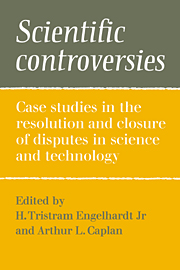 Scientific Controversies
Scientific Controversies Book contents
Preface
Published online by Cambridge University Press: 03 February 2010
Summary
Contemporary societies take science seriously. They presume that science can resolve disputes over factual issues such as the question of whether Laetrile should be used to treat cancer, whether homo-sexuality is a disease, whether nuclear power is safe, or whether a particular concentration of benzene in the workplace is tolerable. Such disputes are, however, not purely “scientific,” as the essays in this volume show. They are formed around and structured by complex ethical and political interests. In fact, more than purely knowledge-directed concerns shape scientific controversies generally, even those concerning the theory of continental drift. A better understanding of the interplay between knowledge-directed and value- or politically directed forces in scientific disputes is required for an appreciation of the very character of culture. Ours is a culture that looks to scientific investigations, panels, and commissions for the determination of facts and the resolution of scientific disputes. This volume is offered as a contribution to the better understanding of the role of science and of the place of nonscientific interests in what may appear, at first glance, to be purely scientific undertakings.
The original conferences and research that produced this volume were supported by a grant from the National Endowment for the Humanities (No. AV-30691–78–200). This project, which addressed the character of scientific disputes with a heavy ethical or political overlay, spanned the years 1978–82. We wish to underscore our debt of thanks to the Endowment and, in particular, to Richard Hedrick, who served as the program officer for the grant. His guidance contributed in many ways to the successful completion of the project.
- Type
- Chapter
- Information
- Scientific ControversiesCase Studies in the Resolution and Closure of Disputes in Science and Technology, pp. vii - viiiPublisher: Cambridge University PressPrint publication year: 1987
